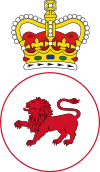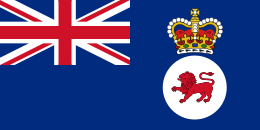James Plimsoll
| The Honourable Sir James Plimsoll AC, CBE | |
|---|---|
| 22nd Governor of Tasmania | |
|
In office 1 October 1982 – 8 May 1987 | |
| Monarch | Elizabeth II |
| Premier |
Doug Lowe (1981) Harry Holgate (1981–82) Robin Gray (1982–87) |
| Preceded by | Sir Stanley Burbury |
| Succeeded by | Sir Phillip Bennett |
| Secretary of the Department of External Affairs | |
|
In office 5 April 1965 – April 1970 | |
| Personal details | |
| Born |
25 April 1917 Sydney, New South Wales |
| Died |
8 May 1987 (aged 70) Hobart, Tasmania |
| Alma mater | University of Sydney |
| Military service | |
| Allegiance | Australia |
| Service/branch | Second Australian Imperial Force |
| Years of service | 1942–47 |
| Rank | Major |
| Battles/wars | Second World War |
Sir James Plimsoll, AC, CBE (25 April 1917 – 8 May 1987) was an Australian diplomat and the 22nd Governor of Tasmania.
Life and career
Plimsoll was born in Sydney and educated at Sydney Boys High School from 1929 to 1933.[1] He graduated from the University of Sydney with a Bachelor of Economics in 1938 and a Bachelor of Arts in 1941. He was then appointed to the Bank of New South Wales as an economist.[2]
With the outbreak of the Second World War, Plimsoll enlisted in the Second Australian Imperial Force in 1942. During the war he was attached to the Directorate of Research and Civil Affairs. In 1945 he was a member of the Australian delegation to the Far Eastern Commission, established to oversee the Allied Council for Japan, which was responsible for the occupation of Japan. At the end of the war, he was on the staff of the Australian School of Pacific Administration, then with the rank of major.[3] He was appointed a First Secretary of the Department of External Affairs in 1948.
Korea
He was appointed the Australian representative on the United Nations Commission for Unification and Rehabilitation of Korea (UNCURK) in 1950, during the Korean War. When UNCURK was established in October 1950 the war was expected to conclude quickly. However, by the time of its first meeting in Seoul in November, China had intervened and unification and rehabilitation was no longer possible. While other UNCURK delegates wanted to leave Korea, Plimsoll persuaded them that it was important that a high-level civilian presence should remain in Korea. UNCURK then moved to the southern city of Busan, along with the Government of the Republic of Korea and played a valuable role in communicating between the Korean Government, the UN military Command and the United Nations in New York. It also observed Korean elections.
Plimsoll had a considerable influence on President Syngman Rhee, to whom he conveyed the views of the United Nations and the troop-contributing nations. He also expressed the Western nations' concerns about Rhee's undemocratic behaviour and abuse of human rights.[4]
Diplomacy
In 1953, Plimsoll returned to Department of External Affairs.[5] He was appointed as Australia's Permanent Representative to the United Nations in 1959 and he became Australia's High Commissioner to India and Ambassador to Nepal in 1962. In 1965, he became head of the Department of External Affairs.
In 1970, Plimsoll was appointed as Ambassador to the United States of America, a job normally reserved in Australia for senior ex-politicians. In 1974, he became Ambassador to the Union of Soviet Socialist Republics. He was appointed as Ambassador to Belgium, Luxembourg and the European Economic Community in 1977 and in 1980 became Australian High Commissioner to the United Kingdom. His final diplomatic post was as Ambassador to Japan in 1981 and 1982.
He was described by the Minister for Foreign Affairs, Alexander Downer, in 2006 as Australia's "greatest Ambassador".[6]
Governor of Tasmania
Plimsoll became Governor of Tasmania in 1982. He was only the second bachelor to serve in the office, and, took on all the patronages normally held by the Governor's spouse. He was hugely popular in the State and his appointment was extended at the end of five years. Plimsoll's sudden death in office in May 1987 was greeted with widespread mourning. He was accorded a State Funeral at St David's Cathedral in Hobart, attended by the Governor-General of Australia and four other State Governors. His remains were transported to Sydney for interment.
Awards and honours
- 1956 — awarded Commander of the Order of the British Empire[7]
- 1962 — created a Knight Bachelor[8]
- 1978 — appointed a Companion of the Order of Australia[9]
- 1982 — appointed a Knight of the Order of St John
- 1984 — Admitted to degree of Doctor of Science in Economics at the University of Sydney
- 1987 — Admitted to degree of Doctor of Laws at the University of Tasmania
- 2009 — A street in the Canberra suburb of Casey was named Plimsoll Drive in Sir James' honour.[10]
Further reading
- Hearder, Jeremy (2015), Jim Plim: Ambassador Extraordinary: A Biography of Sir James Plimsoll, Connor Court Publishing, ISBN 9781925138498
References
- "Papers of Sir James Plimsoll". National Library of Australia. Retrieved 2006-12-24.
Footnotes
- ↑ ORDER OF THE BRITISH EMPIRE (PDF), Sydney High School Old Boys Union
- ↑ Hearder, Jeremy, "Plimsoll, Sir James (1917–1987)", Australian Dictionary of Biography, Australian National University, archived from the original on 28 September 2013
- ↑ World War II Nominal Roll
- ↑ "James Plimsoll and UNCURK". Out in the Cold – Australia's involvement in the Korean War. Australian War Memorial. Archived from the original on 2006-09-09. Retrieved 2006-12-24.
- ↑ CP 452: Sir James PLIMSOLL AC, CBE, KStJ, National Archives of Australia, retrieved 12 September 2014
- ↑ Downer, Alexander (11 May 2006). "Speech: Australia and Europe: Sharing Global responsibilities". Canberra: Australian Government. Archived from the original on 12 February 2014.
- ↑ It's an Honour – Commander of the Order of the British Empire
- ↑ It's an Honour – Knight Bachelor
- ↑ It's an Honour – Companion of the Order of Australia
- ↑ Plimsoll Drive, ACT Government Environment and Sustainable Development Directorate, archived from the original on 27 February 2014

